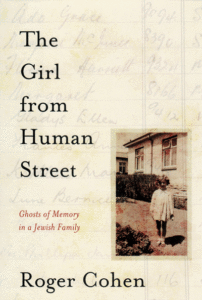The Girl from Human Street: Ghosts of Memory in a Jewish Family, by Roger Cohen, Knopf, $27.95
Reviewed by NEAL GENDLER
Roger Cohen’s tribute to his mother is an interesting story of displacement and its damage to family history and traditions, and sometimes to one’s mental health.
The Girl from Human Street also shows the sheltered, comfortable lives of many South African Jews, 40,000 of whom came from Lithuania between the 1880s and 1914. For example: his father’s astonishment, arriving in London in 1945, at seeing a white woman scrubbing the floor.
In South Africa, “even for a Jewish immigrant family of modest means, the vast black underclass… afforded a good standard of living,” says Cohen, a New York Times columnist. “Because cheap, unskilled black labor abounded, Jews in general avoided manual work and the sweatshop” — a fortune not shared by Lithuanian Jews who headed for the United States.

Apartheid, which Cohen condemns, also meant protection.
“If you are busy persecuting tens of millions of blacks, you do not have much left over for tens of thousands of Jews.” He says South African Jews were discomforted by apartheid — some of its strongest white opponents were Jews — “but this was not genocide,” which consumed relatives remaining in Lithuania.
New opportunity, though, “is only one side of the immigrant story,” Cohen says. Its dark side is “displacement and loss. In each generation on the move, members of my family have been unable to come to terms with the immense struggle involved in burying the past, losing an identity and embracing a new life — as if the bipolarity from which several suffered were… a double existence attempting to bridge the unbridgeable.”
So with his mother, June, who came from wealth created during South Africa’s initial gold-mining boom. She grew up on Human Street in Krugersdorp, a prosperous mining town until the gold ran out.
Despite great effort, she never adapted well to moving, when Cohen was two, from sunny, warm South Africa to chilly, cloudy, struggling 1957 Britain, where Cohen’s father became a famous immunologist. She alternated between mania and deep, prolonged depression — twice attempting suicide — that Cohen attributes partly to displacement.
It is his mother’s troubles, which included long hospitalization that as a child felt to him like desertion, through which most of this story is told. What elevates Cohen’s book above a complex family history — for which he mercifully supplies a family tree — is his skilled writing about the end of Jewish life in Lithuania and of its often secular flourish in South Africa.
“I am not a religious Jew,” Cohen says. “I scarcely practice Judaism.” To his father’s “quest for assimilation [in Britain] was added his distaste for [his] Jewish experience.”
The author’s parents practiced no Judaism, nor educated him for Bar Mitzva. Attending a Christian school, he was unaware of family beginnings in Lithuania and that his upbringing had been “devoted to expunging of this past.”
But Jewishness “is tenacious even in an English vacuum.” Jewish students waited outside during chapel.
Ending the story of his mother’s long struggle on page 203, Cohen says: “I told many other stories from many other datelines before I realized… that the one story I had to tell was hers.”
In literary and emotional terms, that would have been a strong finish. But he continues for 76 pages, telling the sad story of bipolarity and death of a young relative whose parents had moved from South Africa to Israel
In the manner of many at the New York Times, his last two chapters include some swipes at Israel, but given Jews’ history, he considers Israel a necessity.
“I have grown into a liberal Zionist,” he says. Although denouncing Jewish treatment of Arabs, he says: “I knew apartheid… Israel’s oppression of the Palestinians does not constitute apartheid.”
Despite “discrimination both blunt and subtle… Israel’s Arab citizens, 20 percent of the population, enjoy rights unthinkable in apartheid South Africa (and rare for minorities in the Middle East).”
Fortunately, the reporter in him cannot help but seek balance, a quality that so tragically eluded his mother.
***
Neal Gendler is a Minneapolis writer and editor.
(American Jewish World, 1.16.15)



















